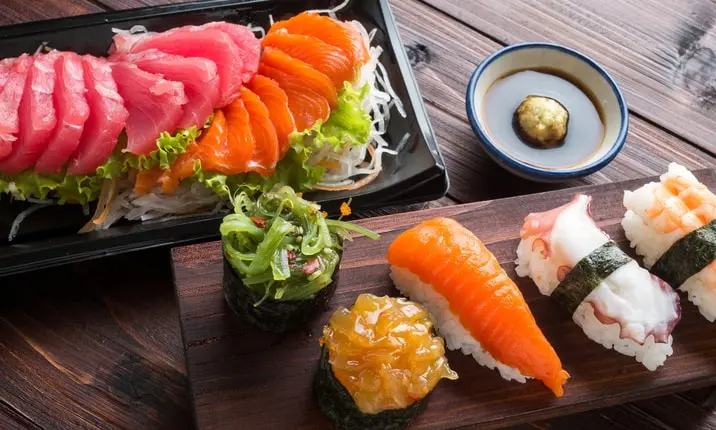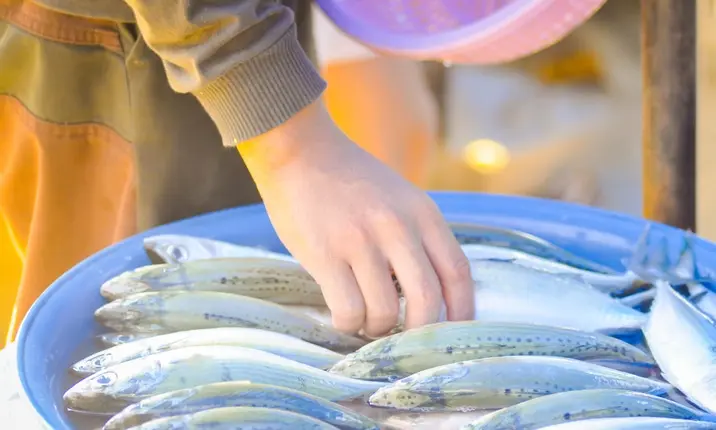Should you worry about tapeworms in yusheng? Dr Leong Hoe Nam talks about the small probability of a parasitic infection in Singapore, and simple ways to stay safe.
A couple of weeks ago, it was reported that there was a 30-year-old male in Singapore who had been diagnosed with a tapeworm. This patient ate raw fish every day, and had no idea he even had an infection until he got stomach cramps and bloody diarrhoea. Shortly afterwards, he passed the entire 2.8m long specimen out of his system.
With Chinese New Year approaching, many of us will be preparing to eat one of our favourite dishes: yusheng (raw fish salad). So, will you be at risk of a parasitic infection? How common are tapeworms? And how can you protect yourself?
Dr Leong Hoe Nam, an infectious diseases physician at Mount Elizabeth Novena Hospital, sheds some light on the topic.
What is a tapeworm infection?
Infection with a tapeworm occurs if a person ingests food or water contaminated with tapeworm eggs or larvae. Ingestion of tapeworm eggs results in the eggs migrating outside the intestines and forming larval cysts in body tissues and organs, whereas when tapeworm larvae are ingested, the intestines become infected by adult tapeworms.
Here are 8 things to know about parasites in raw fish.
Tapeworms are rare (thankfully!)
As Dr Leong Hoe Nam explains, raw fish consumption only rarely results in a parasitic infection in Singapore:
“Although our appetite for raw fish does increase the risk slightly, the Agri-Food & Veterinary Authority of Singapore (AVA) does an excellent job of screening our food. We have strict rules on how fish must be reared, stored and prepared.”
If you're dining out at a reputable restaurant, the fish in your yu sheng should have passed the AVA's stringent safety standards, and will have been separated from any fish ready to be cooked to prevent cross-contamination.
However, Dr Leong also reiterates that you should be careful if you're travelling abroad this Chinese New Year. Not every country has its own AVA, so you shouldn't assume all the food will be clean. Japan, for example, has had more cases of parasitic diseases caused by worms than anywhere else in the world.
Tapeworms don't normally cause symptoms
Often, tapeworms do not cause symptoms. On some occasions, however, the following symptoms may be seen in a person with a tapeworm infection:
- Nausea
- Diarrhoea
- Fatigue
- Weight loss
However, in many cases, the patient is unaware that they have a tapeworm. If you were to get infected, there is a chance you would notice small parts of the worm in your stools as they pass through your system.
The good news is that tapeworms are usually easily treated. Oral medication is normally enough to rid your body of the infection.
More serious than tapeworms is gnathostoma spinigerum, a small worm that can cause gnathostomiasis, which, in turn, can lead to meningitis (a brain infection). Symptoms for this include fever, vomiting, loss of appetite and painful swellings under the skin. Seek medical advice immediately if you experience any of these symptoms after eating yusheng or any other raw fish.
Anisakiasis is a lesser-known parasite, but more common than tapeworms
Anisakiasis, also known as herring worm disease, is caused by small worms that attach to the wall of your food pipe, stomach and intestines. You can get it by eating undercooked fish or squid.
Symptoms include stomach pain, nausea, vomiting, diarrhoea and mild fever. If you experience a tingling sensation in your throat while eating raw fish or squid, you may be able to cough up the worm before swallowing.
It's still extremely rare in Singapore, but it's not unheard of. Luckily, Dr Leong says it's usually not serious: “We only hear of the odd case of anisakiasis, and it's often a mild irritation that doesn't cause other problems. We diagnosis it using an endoscopy (small camera inserted down your throat), and remove the worms during the same procedure.”
Bacterial infections are much more common than tapeworms
You're more likely to experience a bacterial infection from eating undercooked fish than to have a parasite living inside you. These infections range from mild to serious.
Potential bacterial infections from eating undercooked or raw fish include salmonella and listeria infections. Also be aware of the risk of the vibrio vulnificus germ that lives in raw or undercooked shellfish, especially oysters. Vibrio vulnificus infections can cause severe blood poisoning and can be life-threatening.
You may also have heard of strep. In 2015, Singapore experienced an awful outbreak of Group B streptococcus (GBS). Many individuals were infected with this bacteria, and some experienced severe health complications as a result. This ultimately led to the nationwide ban on eating raw freshwater fish, which, of course, meant many hawker stalls and restaurants had to stop serving ikan parang yusheng.
In the middle of 2020, there was a spike in GBS cases in Singapore. This tells us that Singapore and the neighbouring countries are constantly at risk of infection. Be wary of consuming raw fish, especially if you have a weaker immune system.
Other common bacterial infections include salmonella (a bacteria that causes cramps, vomiting, diarrhoea and fever) and aeromonas (a flesh-eating bacteria that causes chronic diarrhoea).
You can protect yourself by eating at regulated restaurants and cafes, higher graded hawker stalls, and by practising high standards of food hygiene at home.
You don't just get sick from eating raw fish
…You can also get sick just from handling it! It's rare, but mycobacterium marinum (a bacterial infection caused by touching fish) can infect the skin of the arms and legs, resulting in red sores or raised bumps. Luckily, a series of antibiotics is usually enough to clear this up.
Any bacterial infection is more likely to spread by cross-contamination. You're not being regulated by a health board at home, but you should still try to follow strict food hygiene standards! Proper hygiene in general is very important – touching clean food with contaminated hands won't help, so always wash your hands thoroughly after handling raw fish.
Using the same utensils or chopping boards for raw fish and other food may also spread germs, so remember to use clean utensils every time.
Shellfish isn't always safe, either
A germ called vibrios vulnificus that lives in raw or undercooked shellfish, especially oysters, can cause severe blood poisoning. In very serious cases, this can be life-threatening. People with underlying liver disease, people who depend on regular blood transfusions and people who have poor immunity – eg. cancer patients, people with chronic renal failure and people with diabetes – are particularly at risk.
This is just one more reason why it's important to take the proper precautions when preparing and serving seafood!
You can't tell if fish is bad just by looking at it
Unfortunately, there is no way to tell if raw fish is safe to eat just by looking at it, or smelling it. You won't be able to see or smell the parasites – they're too small!
You also won't be able to 'kill' any germs by squeezing lime or lemon juice over the fish. The only sure way to rid the fish of germs is to cook it properly.
Luckily, you can minimise your risk of an infection
There are a few ways to protect yourself from both parasitic and bacterial infections when eating any raw fish, not just yu sheng. Here are Dr Leong's suggestions:
- Eat fresh. Don't leave food sitting out for long, as any bacteria will start to multiply
- Prep well. Use clean utensils, wash your hands and disinfect all surfaces properly
- Consume in moderation. Try to limit your raw fish intake and don't eat it every single day. That goes for individual meals too – if you eat one infected oyster, you might be able to get away with it. If you eat 20, you're far more likely to get sick
- Skip entirely. If your immune system is weak, or you're worried about infection, eat cooked fish instead. Don't forget that children and the elderly are also more susceptible to infection – if in doubt, don't serve it!
As an infectious diseases expert with a focus on parasitic infections, I can assure you that tapeworms and other parasites associated with raw fish consumption are indeed a legitimate concern. My expertise is grounded in years of academic training, clinical experience, and research in the field of infectious diseases. I have actively contributed to the understanding and management of parasitic infections, including tapeworms, and have collaborated with reputable health authorities to disseminate accurate information to the public.
Now, addressing the concepts mentioned in the article:
-
Tapeworm Infection:
- A tapeworm infection occurs when a person ingests food or water contaminated with tapeworm eggs or larvae.
- Infection can lead to larval cysts in body tissues and organs or result in adult tapeworms in the intestines.
- Symptoms may include nausea, diarrhea, fatigue, and weight loss, but often, tapeworms are asymptomatic.
-
Tapeworm Rarity and Regulation in Singapore:
- The risk of tapeworm infection from raw fish is relatively low in Singapore due to stringent food safety standards imposed by the Agri-Food & Veterinary Authority (AVA).
- Raw fish in reputable restaurants, particularly in dishes like yusheng, should meet these safety standards, minimizing the risk of contamination.
-
Global Variances in Food Safety:
- Traveling abroad may expose individuals to different food safety standards, emphasizing the need for caution when consuming raw fish in foreign countries.
- Countries without robust food safety regulations may pose higher risks of parasitic infections.
-
Tapeworm Symptoms and Treatment:
- Tapeworms often do not cause noticeable symptoms, but in some cases, symptoms may include nausea, diarrhea, fatigue, and weight loss.
- Treatment typically involves oral medication, and tapeworm infections are generally easily treatable.
-
Other Parasitic Infections:
- Anisakiasis, caused by small worms, is less common than tapeworms but can result from consuming undercooked fish or squid.
- Bacterial infections, such as salmonella and listeria, are more common than parasitic infections and can range from mild to severe.
-
Bacterial Infections from Undercooked Fish:
- Vibrio vulnificus, a bacterium in raw or undercooked shellfish, poses severe risks, including blood poisoning.
- Streptococcus outbreaks highlight the importance of vigilance against bacterial infections from raw fish consumption.
-
Handling and Hygiene:
- Infections can also result from handling raw fish, emphasizing the importance of proper hygiene and using clean utensils and surfaces.
- Mycobacterium marinum, a bacterial infection from touching fish, can be treated with antibiotics.
-
Shellfish Risks:
- Vibrios vulnificus in raw or undercooked shellfish can be life-threatening, particularly for individuals with underlying health conditions.
-
Assessment of Fish Freshness:
- Visual or olfactory assessment of raw fish does not guarantee safety, as parasites are often microscopic.
- Cooking fish thoroughly remains the most effective way to eliminate germs and parasites.
-
Risk Minimization Strategies:
- Eating fresh, properly preparing raw fish, consuming in moderation, and considering individual health conditions are key strategies to minimize infection risks.
- Those with weakened immune systems, such as children and the elderly, should exercise additional caution or opt for cooked fish.
In conclusion, while the risk of tapeworms and other infections from raw fish consumption exists, adherence to proper food safety measures significantly reduces the likelihood of parasitic and bacterial infections. Public awareness and responsible food handling practices play crucial roles in ensuring the safety of raw fish dishes like yusheng.



